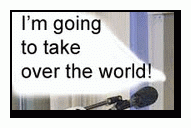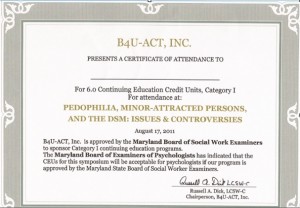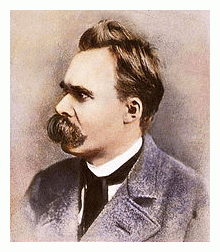
In recent weeks there has been yet another drum-beat talking-point on how Christians in public life are a menace to liberty and democracy.
For, through their faith in the God of the Bible, they are suspected to be morally monstrous followers of a barbaric bronze age god — NOT, and to thus be advancing a Christo-fascist, right-wing, totalitarian, theocracy. (Cf. also here, here.)
And of course, design theory is held to be the creationism- in- a- cheap- tuxedo front for this imagined nefarious Nazi-like agenda inspired by the likes of . . . the late Theologian-Philosopher Francis Schaeffer, who advocated for a new reformation of return to godly, sound reason in light of recognition of the reality of the God who is there, and who is not silent. (And this echoes the titles of Schaeffer’s three key books: Escape from Reason, The God Who is There, and He is There and is Not Silent. Those who are so quick to trot out distorted talking points need to read and cogently respond to these books, first.)
This is yet another instance of the classic, “he-hit-back first,” blame the intended victim, turn-speak, turn-about false accusation — based on the trifecta rhetorical strategy of distraction from issues, willful and even slanderous distortion of people and movements, and demonisation — so beloved of modern Big-Lie propagandists and their dupes; especially those of the Alinskyite Rules for Radicals school of praxis.
(And, BTW, the captioned picture just above is taken from a targetting photo — we know you, we know where you are, we know those you care for, and here’s the targetting picture — hosted by a hate-blog that personally attacks and slanders contributors and commenters at UD. Those who are pushing such talking points need to pause and ask themselves as a first point of correction, how comes “fascism” is a right-wing movement, when its worst manifestation bore the title, National SOCIALISM? Do you now begin to see how — suspiciously — things do not add up here? )
Before we get to the meat of the matter, let’s throw the spotlight on a recent Baltimore B4U-ACT pro pederasty “academic” conference (studiously not headlined in the major media that are busily misleading us with scare-headline alarums over imagined right wing theocratic conspiracies) that inadvertently reveals where all of this is heading. Les Kinsolving reports:

The Baltimore Sun [same city], Washington Post [right next door] and New York Times [supposed newspaper of record] had no coverage of this event, which was attended by a number of admitted pedophiles – or, as this conference re-labeled them, “minor-attracted persons.” . . . .
Among “highlights” of this conference, as reported by Barber and Reisman:
Pedophiles are “unfairly stigmatized and demonized” by society.
“Anglo-Americans’ standard on age of consent is new (and ‘puritanical’). In Europe, it was always set at 10 or 12. Ages of consent beyond that are relatively new and very strange, especially for boys. They’ve always been able to have sex at any age.”
“An adult’s desire to have sex with children is ‘normative.’”
Our society should “maximize individual liberty. We have a highly moralistic society that is not consistent with liberty.”
Dr. Fred Berlin acknowledged that it was political activism, similar to that witnessed at the conference, rather than scientific considerations that successfully led to the declassification of homosexuality as a mental disorder.
“The majority of pedophiles are gentle and rational.”
The diagnostic and statistical manual of mental disorders should “focus on the needs” of the pedophile, and should have “a minimal focus on social control,” rather than obsessing about “the need to protect children.”
Self-described “gay activist” and speaker Jacob Breslow said that children can properly be “the object of our attention.” He further objectified children, suggesting that pedophiles needn’t gain consent from a child to have sex with “it” any more than we need consent from a shoe to wear it. He then used graphic, slang language to favorably describe the act of climaxing . . . “on or with” a child. No one in attendance objected to this explicit depiction of child sexual assault . . . .
“B4U-ACT is the driving force behind this movement. It’s goal is to reconceptualize our thinking about what they politely call ‘minority-attracted persons.’ If they had it their way, sex between adults and minors would no longer be taboo, and pedophilia would no longer be listed as a mental illness by the American Psychiatric Association.”
Got that?
Our society should “maximize individual liberty. We have a highly moralistic society that is not consistent with liberty.”
As those who have been following evolving UD comment-thread discussions in recent days here on and here on will know, what is really going on is that evolutionary materialism is intellectually bankrupt through self-referential incoherence and morally bankrupt through inescapable amorality but dominant in scientific and other major cultural institutions.
As we saw, it has in it no foundational IS that can bear the weight of OUGHT, so it seeks to push the idea that anything goes, so long as a powerful enough and “credible” enough lobby backs it, and of course, we saw that it argues for our being jumped up pond scum by way of apes on the East African savannahs scrambling for survival in light of chance and necessity programming of genes and memes so that we have neither freedom of will nor intellectual responsibility.
So, it is exploiting that cultural influence to delegitimise any questioning or objections to the agendas of radical relativism and amorality that its factions are pushing, ever so hard.
After all, who dares object to “liberty”?
Maybe, the untainted definition of that term from Webster’s Dictionary, 1828, will help us see what is going on behind the willful confusion of genuine liberty with its counterfeit, destructive license:
LIB’ERTY, n. [L. libertas, from liber, free.]
1. Freedom from restraint, in a general sense, and applicable to the body, or to the will or mind. The body is at liberty, when not confined; the will or mind is at liberty, when not checked or controlled. A man enjoys liberty, when no physical force operates to restrain his actions or volitions.
2. Natural liberty, consists in the power of acting as one thinks fit, without any restraint or control, except from the laws of nature. It is a state of exemption from the control of others, and from positive laws and the institutions of social life. This liberty is abridged by the establishment of government.
3. Civil liberty, is the liberty of men in a state of society, or natural liberty, so far only abridged and restrained, as is necessary and expedient for the safety and interest of the society, state or nation. A restraint of natural liberty, not necessary or expedient for the public, is tyranny or oppression. civil liberty is an exemption from the arbitrary will of others, which exemption is secured by established laws, which restrain every man from injuring or controlling another. Hence the restraints of law are essential to civil liberty.The liberty of one depends not so much on the removal of all restraint from him, as on the due restraint upon the liberty of others. In this sentence, the latter word liberty denotes natural liberty.
4. Political liberty, is sometimes used as synonymous with civil liberty. But it more properly designates the liberty of a nation, the freedom of a nation or state from all unjust abridgment of its rights and independence by another nation. Hence we often speak of the political liberties of Europe, or the nations of Europe.
5. Religious liberty, is the free right of adopting and enjoying opinions on religious subjects, and of worshiping the Supreme Being according to the dictates of conscience, without external control.
6. Liberty, in metaphysics, as opposed to necessity, is the power of an agent to do or forbear any particular action, according to the determination or thought of the mind, by which either is preferred to the other. Freedom of the will; exemption from compulsion or restraint in willing or volition.
LI’CENSE, n. [L. licentia, from liceo, to be permitted.] . . .
2. Excess of liberty; exorbitant freedom; freedom abused, or used in contempt of law or decorum.License they mean, when they cry liberty.
Again and again, we see how insightful George Orwell’s 1984 was: the willful corruption of language is the first step to shackling men’s minds to a new tyranny.
In addition, we must recognise the close link between genuine liberty, duties and rights, for without duties of neighbourliness in the circle of the civil peace of justice, there can be no basis for rights.
This is aptly brought out by philosopher Arthur Holmes:
However we may define the good, however well we may calculate consequences, to whatever extent we may or may not desire certain consequences, none of this of itself implies any obligation of command. That something is or will be does not imply that we ought to seek it. We can never derive an “ought” from a premised “is” unless the ought is somehow already contained in the premise . . . .
R. M. Hare . . . raises the same point. Most theories, he argues, simply fail to account for the ought that commands us: subjectivism reduces imperatives to statements about subjective states, egoism and utilitarianism reduce them to statements about consequences, emotivism simply rejects them because they are not empirically verifiable, and determinism reduces them to causes rather than commands . . . .
Elizabeth Anscombe’s point is well made. We have a problem introducing the ought into ethics unless, as she argues, we are morally obligated by law – not a socially imposed law, ultimately, but divine law . . . . This is precisely the problem with modern ethical theory in the West . . . it has lost the binding force of divine commandments. [Ethics: Approaching Moral Decisions (Downers Grove, IL: IVP, 1984), pp. 70 – 72.]
The relevance of this comes out as soon as we consider the concept that we have rights:
If we admit that we all equally have the right to be treated as persons, then it follows that we have the duty to respect one another accordingly. Rights bring correlative duties: my rights . . . imply that you ought to respect these rights.[IBID, p. 81.]
But, why should we consider that people have rights at all? The only enduring answer to this has been aptly summarised in the US Declaration of Independence of 1776:
“We hold these truths to be self-evident, that all men are created equal, that they are endowed by their Creator with certain unalienable rights, that among these are life, liberty and the pursuit of happiness, that to secure these rights, governments are instituted among men, deriving their just powers from the consent of the governed . . .”
In short, the is-ought gap of ethics points to the question that rights and correlative duties arise from our being equally valuable as morally governed, significantly free creatures of God. But such claims often do not sit well with modern or post-modern people, who wish to reject the moral argument to an inherently good God. (Cf. Kreeft & Tacelli here, and short William Lane Craig video here. [His longer audio/video series here may also be helpful.])
But now, we can see some of the unintended consequences of that rejection: evolutionary materialism (while institutionally dominant as the “scientific” account of our roots) has in it no foundational IS that can bear the weight of OUGHT, and so — ironically — it works to undercut the ethical foundations of the very liberty that so many of its adherents demand as their “right.”
Just so, as long as 2350 years ago, in his 360 BC The Laws, Bk X, Plato exposed the strongly associated evolutionary materialist agenda, from chaos in the heavens to chaos in the community. Let us listen to his counsel from the distant past again, lest we forget some of the hardest-earned lessons of history and — yet again — repeat some of the worst chapters of that same history:
The elements are severally moved by chance and some inherent force according to certain affinities among them-of hot with cold, or of dry with moist, or of soft with hard, and according to all the other accidental admixtures of opposites which have been formed by necessity. After this fashion and in this manner the whole heaven has been created, and all that is in the heaven, as well as animals and all plants, and all the seasons come from these elements, not by the action of mind, as they say, or of any God, or from art, but as I was saying, by nature and chance only . . . .

So, we now see exposed the real “dominionism” that we need to address: evolutionary materialist, radical relativist, might makes “right” factionism that seeks to live in tyrannical dominion over the community at the hands of Nietzschean supermen who are so great in their own minds that they make up their own “morality” as they please.
(And of course, the Fascist political messiah is precisely the forerunner of the new order of supermen, who steps into our crisis and rescues the innocent identity group from all its woes and fears through embodying the all-powerful utopian state. I dare call this what it is, spirit of Antichrist, strongman-ist IDOLATRY. And like all other idolatries, it delivers bondage and chaos, not liberation.)
Is there a reasonable alternative?
In responding to a comment by WJM, I suggested:
. . . on good reason, on a soundly conscience-informed worldview that is willing to accept our fellow creatures as being our equals, and that we collectively have a stewardship over our world, we may often identify the OBJECTIVELY right path. That is, moral knowledge is possible, and ethically informed decision making grounded on sound moral insights is also possible.
Here is my own briefing note on that [with attached tools], as an advocate of a properly understood premise of sustainable development, and here is where I stood up in public as an SD practitioner, to defend it [slide show here as a PDF]; as an invited public lecture in my homeland, subsequently published as a peer-reviewed theology and ethics paper in the leading regional Evangelical Journal of theology.
In short, through the generic ethical, creational view of the cosmos and of ourselves in it, with the concept of being equally valuable morally governed creatures, with a stewardship, we can in fact construct a pretty reasonable and publicly defensible ethics for life in community and public policy. And if you want to view this as a political agenda, kindly observe what it advocates, i.e. consultative, participative consensus-driven informed public democracy in a generally communitarian frame of thought. (Cf here an actual national energy policy specifically informed by that frame and developed through that approach.)
The pivot of that position is a correctly understood, well-informed application of the Golden Rule/ Categorical Imperative — despite Kant’s dismissals, on a calmer look, they are logically equivalent in force — that guides personal and community level moral thought, and informs public policy through its application to a reasonable form of the sustainability principle that respects liberty and the civil peace of justice.
So, we are not at all locked up to one form or another of might makes right.
Let us start the corrective from there. [Cf the responses to key objections and “moral monster talking points just before this, here.]
So, there is a possible way forward.
A peaceful, participative, sustainable, democratic, lawful way that empowers stakeholders and strikes the balance of genuine liberty, while restraining the chaotic trends of license and ill-advised arrogant factionalism and idolatrous charismatic, Nietzschean superman political messianism.
For that, it is well worth clipping the passage in Richard Hooker’s 1594+ Ecclesiastical Polity that Locke cited by Locke in his Second Treatise on Civil Government, Ch 2 Sect. 5, when he set out to ground the principles of liberty and justice in a well-governed community that ever since the US Declaration of Independence in 1776, have been the foundation for modern liberty and democracy:
Let us ponder these sobering words in our own time. END